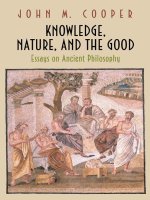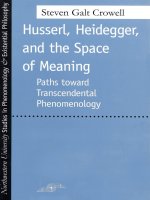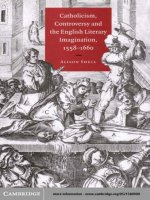northwestern university press husserl heidegger and the space of meaning paths toward trancendental phenomenology apr 2001
Bạn đang xem bản rút gọn của tài liệu. Xem và tải ngay bản đầy đủ của tài liệu tại đây (2.59 MB, 342 trang )
HUSSERL, HEIDEGGER, AND
THE SPACE OF MEANING
Northwestern University
Studies in Phenomenology
and
Existential Philosophy
Founding Editor
†
James M. Edie
General Editors John McCumber
David Michael Levin
Consulting Editors
Robert Bernasconi
Judith P. Butler
David Carr
Edward S. Casey
Stanley Cavell
Roderick M. Chisholm
Hubert L. Dreyfus
Lester E. Embree
Dagfinn Føllesdal
Véronique Fóti
Irene Harvey
Dieter Henrich
Don Ihde
†
Emmanuel Levinas
Alphonso Lingis
William McBride
J. N. Mohanty
†
Maurice Natanson
Graeme Nicholson
Frederick Olafson
Paul Ricoeur
Tom Rockmore
George Schrader
Calvin O. Schrag
Thomas Sheehan
Hugh J. Silverman
Robert Sokolowski
†
Herbert Spiegelberg
Charles Taylor
Samuel J. Todes
Bruce W. Wilshire
David Wood
HEIDEGGER,
AND THE SPACE
OF MEANING
Paths toward Transcendental
Phenomenology
Steven Galt Crowell
Northwestern University Press
Evanston, Illinois
Northwestern University Press
Evanston, Illinois 60208-4210
Copyright © 2001 by Northwestern University Press.
Published 2001. All rights reserved.
Printed in the United States of America
10987654321
ISBN 0-8101-1804-1 (cloth)
ISBN 0-8101-1805-X (paper)
Library of Congress Cataloging-in-Publication Data
Crowell, Steven Galt.
Husserl, Heidegger, and the space of meaning : paths toward transcendental
phenomenology / Steven Galt Crowell.
p. cm. — (Northwestern University studies in phenomenology & exis-
tential philosophy)
Includes bibliographical references and index.
ISBN 0–8101-1804–1 (alk. paper) — ISBN 0–8101-1805-X (pbk. : alk. paper)
1. Husserl, Edmund, 1859–1938. 2. Heidegger, Martin, 1889–1976. I. Title.
II. Series.
B3279.H94 C76 2001
142'.78—dc21 00-046032
The paper used in this publication meets the minimum requirements of the
American National Standard for Information Sciences—Permanence of Paper
for Printed Library Materials, ANSI Z39.48-1984.
To my mother,
and to the memory of my father
This page intentionally left blank
Contents
Acknowledgments xi
Abbreviations xv
Introduction: Reconsidering Transcendental Phenomenology 3
Part 1. Reconfiguring Transcendental Logic
1 Neo-Kantianism: Between Science and Worldview 23
2 Emil Lask: Aletheiology as Ontology 37
3 Husserl, Lask, and the Idea of Transcendental Logic 56
4 Lask, Heidegger, and the Homelessness of Logic 76
5 Making Logic Philosophical Again 93
Part 2. Phenomenology and the Very Idea of Philosophy
6 Heidegger’s Phenomenological Decade 115
7 Question, Reflection, and Philosophical Method
in Heidegger’s Early Freiburg Lectures 129
8 Philosophy as a Vocation: Heidegger and University Reform
in the Early Interwar Years 152
9 Husserl, Heidegger, and Transcendental Philosophy:
Another Look at the Encylopædia Britannica Article 167
10 Ontology and Transcendental Phenomenology
between Husserl and Heidegger 182
11 Heidegger’s Phenomenology and the Question of Being 203
12 Metaphysics, Metontology, and the End of Being and Time 222
13 Gnostic Phenomenology: Eugen Fink and the Critique
of Transcendental Reason 244
Notes 265
Works Cited 305
Index 315
Acknowledgments
I would like to thank the following publishers for kind permission to
reprint here the works for which they continue to hold the copyright.
Chapter 1 first appeared as “Neo-Kantianism” in A Companion to
Continental Philosophy, ed. Simon Critchley and William Schroeder (Ox-
ford: Basil Blackwell, 1998). Chapter 2 was first published in Kant-Studien
87 (1996), but it had been written for another project in 1985 and had
been in circulation since then. Chapter 3 was published in Husserl and
the Phenomenological Tradition, ed. Robert Sokolowski (Washington, D.C.:
Catholic University of America Press, 1988). Chapter 4 first appeared
in The Journal of the British Society for Phenomenology 23, no. 3 (1992).
Chapter 5 was published as “Making Logic Philosophical Again (1912–
1916),” in Reading Heidegger from the Start: Essays in His Earliest Thought,
ed. Theodore Kisiel and John van Buren (Albany: State University of
New York Press, 1994). Chapter 6 appeared in Man and World 28, no. 4
(1995). Chapter 7 appeared in Phenomenology Japanese and American, ed.
Burt C. Hopkins (Dordrecht: Kluwer, 1998). Chapter 8 was published in
History of Philosophy Quarterly 14, no. 2 (1997). Chapter 9 was originally
published in Philosophy and Phenomenological Research 50, no. 3 (1990).
Chapter 10 was published in Husserl in Contemporary Context, ed. Burt C.
Hopkins (Dordrecht: Kluwer, 1997). Chapter 11 first appeared as the
entry “Phenomenology and the Question of Being: Heidegger” in The
Edinburgh Encyclopedia of Continental Philosophy, ed. Simon Glendinning
(Edinburgh: Edinburgh University Press, 1999). Chapter 12 appeared in
Philosophy and Phenomenological Research 60, no. 2 (2000).
Having incurred many debts, intellectual and otherwise, during the
fifteen years sedimented in the chapters of this book, it would be hard to
do justicehereto the specific waysinwhich I have benefitedfromthe help,
criticism, and support of so many people. I would have to start by thanking
Karsten Harries and Robert Sokolowski, both ofwhomhavebeenmentors
of the first rank, and I would have to acknowledge in memoriam an even
deeper debt of gratitude to Maurice Natanson, who introduced me to
phenomenology and so, in a sense, to philosophy. More concretely, my
xi
xii
ACKNOWLEDGMENTS
work has been materially supported by the generous travel stipends and
enlightened leave policy of the School of Humanities at Rice University,
and I would express my gratitude to Allen Matusow, former dean of the
school, and to Judith Brown, the current dean, for fostering, in this and
other ways, an environmentinwhichscholarshipcanflourish.In the same
vein, I should thank the members of the Philosophy Department at Rice
for their collegiality; it is hard to overestimate the importance of mutual
respect inthese contentious times. The members of the Continental The-
ory Workshop, aninterdisciplinary faculty group sponsored by the Center
for the Study of Cultures at Rice, also deserve thanks for the constant
intellectual stimulation that has kept me focused on fundamental issues.
In particular Jack Zammito, Harvey Yunis, Lane Kauffmann, and Tullio
Maranh
˜
ao haveforced me to be very specific about what phenomenology
can contribute to interdisciplinary discussion.
But how would it be possible to acknowledge all those who have
done so much to foster my thinking about Husserl and Heidegger? Many
of these chapters were aired in their raw, naked form at meetings of
the Husserl Circle and of the Society for Phenomenology and Existential
Philosophy, and a list of those to whom I owe thanks would have at least to
include those who attended these sessions. But even so it would be wrong
not to express special thanks to Burt Hopkins, who has providedan outlet
for several of my essays and has always been a trenchant interlocutor in
matters concerning the Husserl-Heidegger relation. Similarly, much of
what I have done over the past several years would not have attained
whatever acuteness it possesses had it not been forTheodore Kisiel,whose
generosity with his time and great knowledge of Heidegger have been a
constant provocation to my thinking. A different sort of provocation,
and one for which I am no less grateful, has been provided by Hubert
Dreyfus and the many who, having learned from him, do not, in our
discussions together, make my Husserlian reading of Heidegger any
easier, only better—among whom special thanks go to Charles Guignon,
William Blattner, and John Haugeland. All the more grateful am I, then,
for the many conversations about matters Husserlian that I have been
fortunate to have had with John Drummond, whose work is a model of
the genre. Perhaps the most up-to-the-minute note of gratitude would
go to an anonymous reader for Northwestern University Press, whose
several excellent suggestions regarding the argument, to which I could
respond here mostly only by way of promissory notes, point toward just
the sort of discussion of these issues I hope will be the ultimate product
of this book.
xiii
ACKNOWLEDGMENTS
This book is dedicated to my parents, since it is thanks to them that
I not only came to appreciate the life of the mind but had the resources
to live it. My fondest hope is that my work will not fail to reflect their
virtues. At the same time, I am a man who, like every other, lives from day
to day, and those days are shared, gloriously, with my wife, Laura Lark.
To her, then, the last best word of thanks.
Thhis page intentionally left blank
Abbreviations
References to the writings of Husserl and Heidegger have, where possi-
ble, been included in the text according to the following abbreviations
of Heidegger’s Gesamtausgabe (GA) and the Hussserliana (Hua) series.
The German pagination is given directly after the colon, and where an
English translation is readily available, I have listed that page after a slash.
However, Ihave sometimes altered the publishedtranslation. Where such
translations are not available, I have made my own. References to works
not found in these series are given in the notes and the list of works cited.
Heidegger’s Works
GA 1 Frühe Schriften, edited by Friedrich-Wilhelm von
Herrmann (Frankfurt: Vittorio Klostermann, 1976).
GA 2 Sein und Zeit, edited by Friedrich-Wilhelm von Herrmann
(Frankfurt: Vittorio Klostermann, 1976); translated by
John Macquarrie and Edward Robinson under the title
Being and Time (New York: Harper and Row, 1962).
GA 3 Kant und das Problem der Metaphysik, edited by
Friedrich-Wilhelm von Herrmann (Frankfurt: Vittorio
Klostermann, 1976); translated by Richard Taft under
the title Kant and the Problem of Metaphysics (Bloomington:
Indiana University Press, 1997).
GA 9 Wegmarken, edited by Friedrich-Wilhelm von Herrmann
(Frankfurt: Vittorio Klostermann, 1976); includes
“Letter on Humanism,” translated by Frank Capuzzi,
and “What Is Metaphysics?” translated by David Farrell
Krell, in Basic Writings, ed. David Farrell Krell (New York:
HarperCollins, 1993).
GA 17 Einf¨uhrung in die ph¨anomenologische Forschung, edited by
Friedrich-Wilhelm von Herrmann (Frankfurt: Vittorio
Klostermann, 1994).
xv
xvi
ABBREVIATIONS
GA 19 Platon: Sophistes, edited by Ingeborg Sch
¨
ußler (Frankfurt:
Vittorio Klostermann, 1992).
GA 20 Prolegomena zur Geschichte des Zeitbegriffs, ed. Petra Jaeger
(Frankfurt: Vittorio Klostermann, 1979); translated by
Theodore Kisiel under the title History of the Concept
of Time: Prolegomena (Bloomington: Indiana University
Press, 1985).
GA 21 Logik: Die Frage nach der Wahrheit, edited by Walter Biemel
(Frankfurt: Vittorio Klostermann, 1976).
GA 24 Die Grundprobleme der Phänomenologie, edited by
Friedrich-Wilhelm von Herrmann (Frankfurt: Vittorio
Klostermann, 1975); translated by Albert Hofstadter
under the title The Basic Problems of Phenomenology
(Bloomington: Indiana University Press, 1982).
GA 25 Phänomenologische Interpretationen von Kants Kritik der
Reinen Vernunft, edited by Ingtraud Görland (Frankfurt:
Vittorio Klostermann, 1977).
GA 26 Metaphysische Anfangsgründe der Logik im Ausgang von
Leibniz, edited by Klaus Held (Frankfurt: Vittorio
Klostermann, 1978); translated by Michael Heim
under the title The Metaphysical Foundations of Logic
(Bloomington: Indiana University Press, 1984).
GA 29/30 Die Grundbegriffe der Metaphysik: Welt, Endlichkeit,
Einsamkeit, edited by Friedrich-Wilhelm von Herrmann
(Frankfurt: Vittorio Klostermann, 1983).
GA 40 Einführung in die Metaphysik, edited by Petra Jaeger
(Frankfurt: Vittorio Klostermann, 1983); translated
by Ralph Manheim under the title An Introduction to
Metaphysics (New Haven, Conn.: Yale University Press,
1959).
GA 56/57 Zur Bestimmung der Philosophie, edited by Bernd
Heimbüchel (Frankfurt: Vittorio Klostermann, 1987).
GA 58 Grundprobleme der Phänomenologie (1919/20), edited by
Hans-Helmuth Gander(Frankfurt:VittorioKlostermann,
1993).
GA 59 Phänomenologie der Anschauung und des Ausdrucks: Theorie
der philosophischen Begriffsbildung, edited by Claudius
Strube (Frankfurt: Vittorio Klostermann, 1993).
GA 61 Phänomenologische Interpretationen zu Aristoteles: Einführung
in die Phänomenologische Forschung, edited by Walter
Bröcker and Käte Bröcker-Oltmanns (Frankfurt: Vittorio
Klostermann, 1985).
xvii
ABBREVIATIONS
GA 63 Ontologie (Hermeneutik der Faktizität), edited by Käte
Bröcker-Oltmanns (Frankfurt: Vittorio Klostermann,
1988).
GA 65 Beiträge zur Philosophie (Vom Ereignis), edited by
Friedrich-Wilhelm von Herrmann (Frankfurt: Vittorio
Klostermann, 1989).
Husserl’s Works
Hua I Cartesianische Meditationen und Pariser Vorträge, edited
by S. Strasser (The Hague: Martinus Nijhoff, 1963);
translated by Dorion Cairns under the title Cartesian
Meditations (The Hague: Martinus Nijhoff, 1969).
Hua II Die Idee der Phänomenologie: Fünf Vorlesungen, edited by
Walter Biemel (The Hague: Martinus Nijhoff, 1958);
translated by William P. Alston and George Nakhnikian
under the title The Idea of Phenomenology (The Hague:
Martinus Nijhoff, 1964).
Hua III Ideen zu einer reinen Phänomenologie und phänomenologischen
Philosophie: Erstes Buch, edited by Walter Biemel (The
Hague: Martinus Nijhoff, 1950); translated by F. Kersten
under the title Ideas Pertaining to a Pure Phenomenology and
to a Phenomenological Philosophy: First Book (The Hague:
Martinus Nijhoff, 1983).
Hua IV Ideen zu einer reinen Ph¨anomenologie und ph¨anomenologishen
Philosophie: Zweites Buch, edited by Marly Biemel (The
Hague: Martinus Nijhoff, 1952); translated by R.
Rojcewicz and A. Schuwer under the title Ideas Pertaining
to a Pure Phenomenology and toa Phenomenological Philosophy:
Second Book (Dordrecht: Kluwer Academic Publishers,
1989).
Hua V Ideen zu einer reinen Phänomenologie und phänomenologischen
Philosophie: Drittes Buch, edited by Marly Biemel (The
Hague: Martinus Nijhoff, 1952); translated by Ted E.
Klein and William E. Pohl under the title Ideas Pertaining
to a Pure Phenomenology and toa Phenomenological Philosophy:
Third Book (The Hague: Martinus Nijhoff, 1980).
Hua VI Die Krisis der Europäischen Wissenschaften und die
transzendentale Phänomenologie: Eine Einleitung in die
phänomenologische Philosophie, edited by Walter Biemel
xviii
ABBREVIATIONS
(The Hague: Martinus Nijhoff, 1954); translated by
David Carr under the title The Crisis of European Sciences
and Transcendental Phenomenology: An Introduction to
Phenomenological Philosophy (Evanston, Ill.: Northwestern
University Press, 1970).
Hua VII Erste Philosophie (1923/24): Erster Teil: Kritische
Ideengeschichte, edited by Rudolf Boehm (The Hague:
Martinus Nijhoff, 1956).
Hua IX Phänomenologische Psychologie: Vorlesungen Sommersemester
1925, edited by Walter Biemel (The Hague: Martinus
Nijhoff, 1962).
Hua XVII Formale und transzendentale Logik, edited by Paul Janssen
(The Hague: Martinus Nijhoff, 1974); translated by
Dorion Cairns under the title Formal and Transcendental
Logic (The Hague: Martinus Nijhoff, 1969).
Hua XIX/1 Logische Untersuchungen, edited by Ursula Panzer (The
Hague: Martinus Nijhoff, 1984), vol. 2, pt. 1; translated
by J. N. Findlay under the title Logical Investigations, 2
vols. (London: Routledge and Kegan Paul, 1970).
Hua XIX/2 Logische Untersuchungen, edited by Ursula Panzer (The
Hague: Martinus Nijhoff, 1984), vol. 2, pt. 2; translated
by J. N. Findlay under the title Logical Investigations, 2
vols. (London: Routledge and Kegan Paul, 1970).
Hua XXIV Einleitung in die Logik und Erkenntnistheorie, edited by
Ulrich Melle (The Hague: Martinus Nijhoff, 1984).
Hua XXV Aufsätze und Vorträge (1911–1921), edited by Thomas
Nenon and Hans Rainer Sepp (The Hague: Martinus
Nijhoff, 1987); includes “Philosophy as Rigorous
Science,” in Phenomenology and the Crisis of Philosophy,
translated by Quentin Lauer (New York: Harper and
Row, 1965).
HUSSERL, HEIDEGGER, AND
THE SPACE OF MEANING
Thhis page intentionally left blank
Introduction
Reconsidering Transcendental
Phenomenology
T
he theme of this book is the space of meaning and the path opened
up to its philosophical elucidation by Husserl and Heidegger. The
space of meaning is familiar to philosophers under many names,
reflecting diverse views of what is most important about it. Recently, Wil-
fred Sellars’s name for it—the “space of reasons”—has come into vogue,
signaling an interest in distinguishing between explanations that also
provide justifications (reasons) and those that do not (causes). Earlier it
was common to talk in Wittgensteinian terms of “logical space” in which
individual phenomena (or sentences) had their “place.” Earlier still, neo-
Kantian philosophers spoke of the Geltungsbereich, or “realm of validity,”
to distinguish the specific theme of philosophy from that of the empirical
sciences of nature or the historical sciences. In the tradition that informs
the approach taken in the present volume, the space of meaning has also
been identified in various ways. Early Husserl (followed by the earliest
Heidegger) called it the field of “phenomenological immanence.” Later,
he would rechristen it “transcendental consciousness,” while Heidegger
preferred simply to speak of “world.” A philosophical topos capable of
being approached under so many designations will not be surveyable
in a single pass. Indeed, as the messianic faith in something called the
“linguistic turn” shows every sign of having receded in late-twentieth-
century philosophy, it becomes possible to recognize that what has distin-
guished philosophy in the twentieth century is not that it has concerned
itself with language, but that, whether through the prism of language
or not, it has concerned itself with meaning. The present volume aims
to contribute something to this ongoing inquiry. Specifically, it argues
that transcendentalphenomenologyisindispensable to thephilosophical
elucidation of the space of meaning.
No doubt this argument flouts the spirit of the times—whether
measured in “analytic” or “continental” terms—and this along two axes.
3
4
HUSSERL, HEIDEGGER, AND THE SPACE OF MEANING
First, in spite of important work by Mohanty, Sokolowski, and others,
transcendental phenomenology is still too often simply dismissed as a
relic, as “Cartesian,” “foundationalist,” “idealist”—all terms of deepest
opprobrium in contemporary philosophy. But Husserl’s thought has not
been well understood, because it has not been read, by most of those who
criticize it. And among those who are well positioned to understand it,
that philosophy has long been held hostagetoanimositiesstemmingfrom
the collapse ofthe personal relationship between Husserl and Heidegger.
For too long the philosophical significance of phenomenology has been
hostage to the clannish behavior of phenomenologists such that the only
possible conjunction between Husserl and Heidegger appears to be an
either/or. Which brings me tothesecondaxis:Among students of Husserl
and Heidegger, it will likely seem perverse to identify as “transcendental
phenomenology” Heidegger’s contribution to an elucidation of the space
of meaning. Heidegger takes center stage in this book, but it is a Heideg-
ger whose philosophical relevance depends largely on our being able
to recollect the Husserlian infrastructure of his work and to carry out
new constitutional analyses within the framework Heidegger provides.
Thus, I claim that his decisive contribution remains within the horizon
of transcendental phenomenology and does not lie in some sort of
hermeneutic, pragmatic, or postmodern “break” with that horizon. Such
a claim obviously requires much defense, some of which can be found
in the chapters that follow. These take up the challenge of suggesting
not only how a successful philosophical grasp of the space of mean-
ing demands transcendental phenomenology, but also how the Husserl-
Heidegger relation can be understood so as to make the distinctive
contributions of each accessible within that ongoing phenomenological
project.
1
In carrying out this task, an interpretation of the early Heidegger—
the one who is still on the way to Being and Time—proves crucial. Parts 1
and 2 of this book reflect this in different ways. Part 1 concerns the tradi-
tion oftranscendentallogicas developed in neo-Kantianism (especiallyby
the most original member of the Baden school, Emil Lask) and as appro-
priated by Heidegger during his student years at Freiburg. Focus on Lask
and the issueof transcendental logic achieves two things. First, it becomes
clear how third-generation neo-Kantians like Lask, whose work was deeply
informed by motifs from German idealism, were alive to aspects of the
philosophy of meaning that have surfaced in more recent approaches to
the “space of reasons.”Lask, for instance, offers an account ofthe relation
between meaning and truth, and the rudiments of a nonmentalistic
(nonrepresentational) concept of mind, that strongly anticipate the post-
Quinean efforts of those whom I would call the neo-neo-Kantians.
2
Then
5
RECONSIDERING TRANSCENDENTAL PHENOMENOLOGY
as now, however, we find lacunae, blind spots that come into view only by
adopting a more phenomenological approach. A look at the differences
between Lask, Heidegger, and Husserl on the topic of meaning, then,
provides insight into those places where appeal to phenomenology might
even now be necessary if the “unboundedness of the conceptual” is to
be made perspicuous. Second, we thereby gain a platform for a new
reading of the Husserl-Heidegger relation itself, one oriented toward
their interest in a common philosophical problem.
The beginning of such a reading is attempted in part 2. Again
focusing on the early Heidegger—his lecture courses from the 1920s
and especially those given in Freiburg between 1919 and 1923—these
chapters explore Heidegger’s relation to the problematic of transcen-
dental phenomenology and seek a more nuanced understanding of his
criticism of Husserl. They emphasize in the early Heidegger’s work a
proximity to Husserlian thinking which is otherwise easy to ignore
3
and
provide the basis for a general reading of Being and Time that treats its
continuity with the transcendental tradition as philosophically decisive.
Heidegger’s achievement would thus consist in his systematic effort to
respect the difference between straightforward (positive) and reflective
(critical) inquiries—the difference between entities and the meaning of
entities—while simultaneously doing justice to the demand that philos-
ophy demonstrate the grounds of its own possibility as an inquiry into
meaning. It is as a philosophy of meaning that Heidegger’s thought is
essentially phenomenological; it is as a philosophy of philosophy that it
is essentially transcendental.
To say that Husserl and Heidegger share an orientation toward a
common philosophical problem—the phenomenon of meaning—is not,
however, to say that their conceptions of meaning are the same. While I
hold that Heidegger’s philosophy cannot abandon essential tenets of
Husserlian phenomenology, I also see a philosophically decisive devel-
opment “from” Husserl “to” Heidegger precisely in the working out of
a richer conception of meaning. That development can be character-
ized, roughly, as an increasing appreciation for the existential ground
of meaning. Husserl’s breakthrough to transcendental phenomenology,
to a genuinely universal theory of meaning, came with the recognition
that the notion of signification (Bedeutung), which “originally . . . con-
cerned only the linguistic sphere,” can “find application of a certain
kind to . . . all acts, be they now combined with expressive acts or not.”
Meaning (Sinn) now designates the signification that pertains to “all
intentive mental processes” (HuaIII:256/294). But meaning in that sense
is a far richer phenomenon than even Husserl recognized, and an ac-
count of it (beyond what has thus become only an analogy with linguistic
6
HUSSERL, HEIDEGGER, AND THE SPACE OF MEANING
signification) points toward the embedding of acts, or “intentive mental
processes,” in something phenomenologically more primordial. Thus,
for Heidegger, like Husserl, “meaning is that wherein the intelligibility of
something maintains itself”; however, it is not originally the correlate of
an act but the “upon which of the project in terms of which something
becomes intelligible as something” (GA 2:201/193). Actanalysis will have
to be founded in project analysis, yet I shall argue that this does not
render act analysis otiose; nor does existential supplant transcendental
phenomenology.
Though the chapters in parts 1 and 2 were written at different times
and for different occasions, each arose as an argument within the project
horizon just described. And though the structure pretty closely follows
the chronology of Heidegger’s thinking, the chapters retain a certain
autonomy within the whole. Readers who prefer to browse by topic,
then, should not find the going difficult. At the same time, because of a
fairly tight thematic unity, I have found it neither necessary nor desirable
to revise extensively—though obviously much more could be said on
the issues. Specifically, I have not tried to draw connections between
the approach to the space of meaning found in neo-Kantians such as
Lask and the approach that is pursued in recent neo-neo-Kantianism. To
those familiar with these contemporary philosophers the connections
will be apparent, but to have drawn them into the discussion would
have distracted from the flow of an argument whose primary concern
is with a chapter in the history of phenomenological philosophy. A
debate between the old neo-Kantians and these new ones would require
a fresh start. In addition, the terms in which Lask poses the problem
have, on their own, much to recommend them, and perhaps essays that
take those terms seriously might spark a deeper reception of Lask than
has been evident so far in the Anglophone world. Nevertheless, it will
be useful to say a word or two about John McDowell’s position further
along in this introduction, for it shows quite clearly where transcendental
phenomenology finds its natural place in the reflection on meaning
pursued in a nonphenomenological idiom.
A second area where I have resisted the temptation to revise con-
cerns the interpretation of the “young” Heidegger’s position. Much work
has been done on these matters in recent years as more scholars have
taken up the challenge of theearlylecturecourses.My own interpretation
has developed over the past decade and a half in light of the problematic
that interests me—certainly not the only possible angle on Heidegger’s
Denkweg —and though I have occasionally reviewed my differences with
other researchers (notably Theodore Kisiel), I have generally avoided
forays into polemics. However, since his forceful, comprehensive, and









